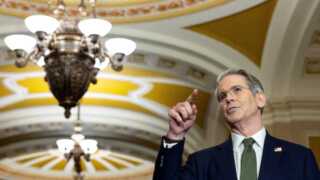Summary
- South Korea finance chief was set to board for Washington when news of delay broke
- Pressure piling on Seoul after Japan clinches trade deal
- Range of sectors, investment projects considered under potential deal remain unclear
- South Korea to propose investment package of at least $100 billion -Yonhap
SEOUL, (Reuters) – Talks between top South Korean and U.S. officials to negotiate over U.S. President Donald Trump’s tariffs have been postponed due to a scheduling conflict for U.S. Treasury Secretary Scott Bessent, South Korea’s finance ministry said on Thursday.
The two sides will reschedule the so-called 2+2 meeting between Bessent and South Korean Finance Minister Koo Yun-cheol, as well as the top trade envoys of both countries, as soon as possible, the ministry said.
Koo was set to board a flight for Washington on Thursday to attend the meeting on Friday in the hope of hammering out a deal that would spare Asia’s fourth-largest economy from Trump’s punishing 25% tariffs set to take effect on August 1.
The sudden announcement by the finance ministry an hour before Koo’s departure cast fresh doubts about whether Seoul would be able to pull off an agreement to avert U.S. import duties that could hit some of its major exporting industries.
“It might be difficult to reschedule 2+2 again before August 1st, so the best we can do is for the trade chief Yeo to request an extension of the tariff exemption,” said Heo Yoon, international trade professor at Sogang University, referring to Minister for Trade Yeo Han-koo
The benchmark KOSPI stock index trimmed early gains to trade up 0.7% as of 0134 GMT, as auto and auto parts makers fell on news of the postponed talks, with Hyundai Motor dropping as much as 1.8%.
Washington gave no further details for postponing Friday’s meeting, the finance ministry said, though U.S. officials are embroiled in a flurry of different negotiations.
Bessent was set to meet China’s Vice Premier He Lifeng in Sweden for a new round of trade talks ahead of the August 12 deadline set for Beijing. Washington is also moving towards a deal with the European Union.
Trade minister Yeo and Industry Minister Kim Jung-kwan, who have travelled to Washington this week, have been meeting with U.S. officials as scheduled, the South Korean government said.
Yeo will hold a meeting with U.S. Trade Representative Jamieson Greer, the industry ministry said.
PRESSURE TO MATCH JAPAN DEAL
Pressure on South Korea heightened this week after Japan clinched a deal with the United States, which Trump said would see Tokyo allowing greater market access for American products including autos and some agricultural products.
The agreement includes a commitment by Japan for a $550 billion package of U.S.-bound investment and loans.
The two major Asian security allies of the United States compete in areas such as autos and steel, and Japan’s deal was seen by investors as a benchmark for the type of agreement Seoul should try to squeeze out in negotiations, analysts have said.
The involvement of a range of ministerial-level officials from Seoul in broad discussions with U.S. officials in recent days suggested the two sides were at work on a trade package that could potentially involve a range of sectors, including South Korea’s sensitive farm markets.
South Korean officials have said access to U.S. markets is key to industrial cooperation between the allies that would help rebuild American manufacturing industries.
Seoul is set to propose to Washington an investment package plan worth at least $100 billion which would involve major South Korean conglomerates like Samsung and Hyundai Motor Group, Yonhap News Agency reported.
President Lee Jae Myung met Hyundai Motor Group Executive Chair Euisun Chung and LG Group Chairman Koo Kwang-mo this month and discussed their U.S. investments, Lee’s office said.
Lee also planned to meet Samsung Electronics Chairman Jay Y. Lee on Thursday, the Dong-A newspaper reported.
Finance ministry officials in Seoul declined to comment on media reports that Washington is asking South Korea to set up a large-scale investment fund.
South Korea has been reviewing the feasibility of joining a $44 billion gas pipeline project in Alaska floated by Trump.
Reporting by Jihoon Lee, Cynthia Kim, Ju-min Park, Joyce Lee, Writing by Jack Kim Editing by Ed Davies and Shri Navaratnam
Source: worldautoforum.com




